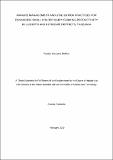| dc.description.abstract | The use of cattle manure in agricultural fields improves soil quality and contributes to nutrient recycling when applied back to the soil compared with synthetic fertilizers that are associated with high cost and limited access. The Community Action Research Project was conducted at Lushoto and Korogwe Districts, exploring the practices associated with manure management and utilization in selected seven villages. Two hundred farmers were interviewed, 120 samples of manure collected and 112 soil samples taken from farm applied with (66) and farm not applied with manure (66). The soils analysis of Nitrogen (N), Phosphorus (P), Potassium (K), Organic Carbon (OC), Organic Matter (OM), soil pH, Cation Exchange Capacity (CEC) and Electro Conductivity (EC) were done. Analytical results show that in the farms applied with manure the average of NPK values were 0.21%, 0.23% and 1.63% respectively while those not applied with manure had average NPK of 0.12%, 0.11% and 0.61% respectively. Other parameters in farms applied with manure were pH 6.95, EC 0.12 dS/m, CEC 24.26 Meq 100g-1 of soil, SOC 2.43 % and SOM 4.19%. The average chemical properties of pit compost manure were 1.78%N, 1.58%P, and 1.28% K while the surface stored manure had 2.51%N, 1.78%P and 1.23%K. Farms applied with manure showed a relative increase in nutrients and the surface stored manure had increased nutrient content compared to pit composite. The study observed poor manure handling practices. This shows the need for training these farmers on proper manure management. Studies on understanding the effects of inherent manure microbial composition and environmental factors such as temperature and moisture on manure quality under the different storage practices are recommended. | en_US |

